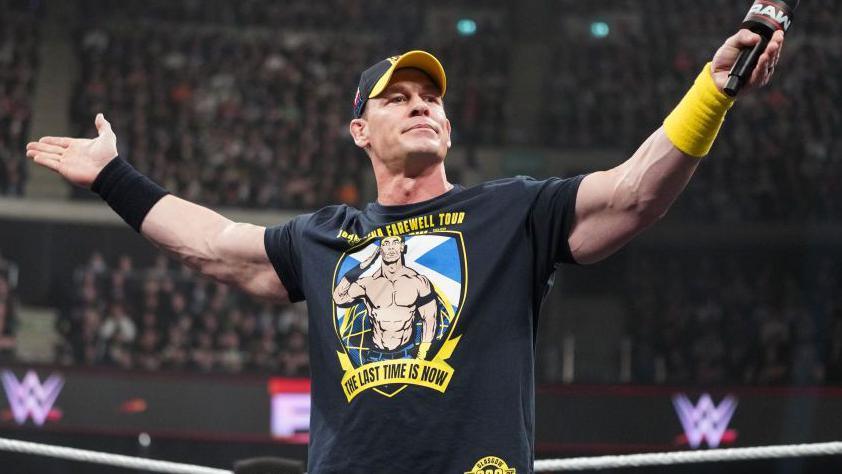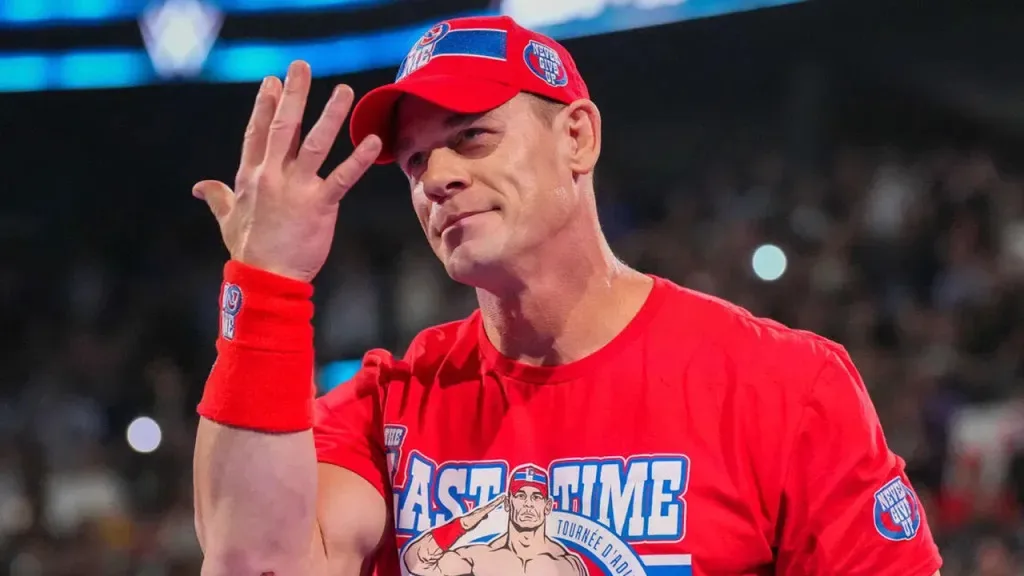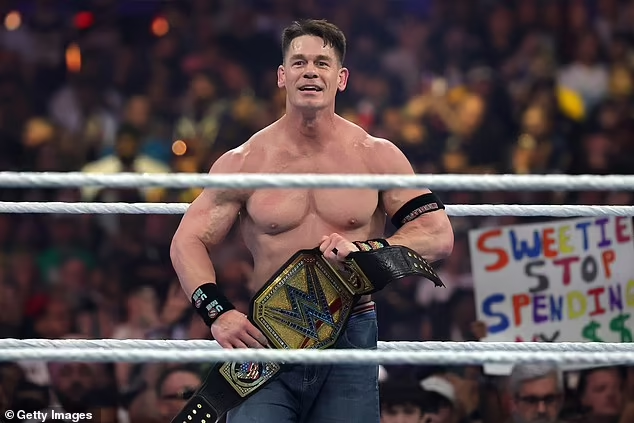It’s the kind of revelation no one saw coming — a truth so deeply personal, so utterly human, that it has left millions of fans around the world reeling. For over two decades, John Cena has stood as a symbol of power, resilience, and optimism. The face of “Never Give Up.” The man who made strength look effortless.
But now, the world knows that even the strongest among us can crumble behind the scenes.
In a stunning announcement early Tuesday morning, Cena’s family confirmed what many in the industry had quietly feared: the global superstar has been privately battling a serious neurological illness for years, and his health has recently taken a devastating turn. The news not only shocked fans but also peeled back the curtain on a man who spent years carrying the weight of his pain in silence — for the sake of his fans, his career, and his legacy.

A Devastating Truth Hidden in Plain Sight
According to a statement released by Cena’s brother, Dan Cena, the 47-year-old actor and wrestling icon was diagnosed several years ago with a rare, degenerative neurological condition that affects motor control, speech, and cognitive focus.
“John didn’t want the world to see him as sick,” the statement read. “He didn’t want pity, attention, or headlines. He wanted to keep doing what he loves — inspiring people. But it’s reached a point where we can no longer hide it. His condition has worsened faster than expected.”
Behind the words was heartbreak — and relief. Relief that the family no longer had to pretend everything was fine. For months, speculation had been quietly spreading online as fans noticed subtle changes in Cena’s demeanor: a slight tremor in his hands during interviews, slower speech during public appearances, and an uncharacteristic hesitancy when moving in the ring.
But true to form, Cena deflected every concern with a smile. He told interviewers he was “just tired,” or “recovering from a neck strain.” No one imagined the truth was so serious — that the symbol of physical perfection, the man who built his career on strength and discipline, was losing control of the very body that made him famous.
‘He Never Wanted the Spotlight on His Pain’
Those who have worked closely with Cena describe a man who fought tooth and nail to keep his private struggles off camera. On the set of Peacemaker Season 2, crew members noticed he began taking frequent breaks, sometimes stepping aside for balance or physical therapy sessions. Yet between takes, he remained his usual self — cracking jokes, mentoring younger actors, motivating everyone around him.

A close friend from WWE, who asked to remain anonymous, recalled one moment during a reunion taping last year that now feels haunting in hindsight:
“He stumbled getting out of the ring. It was quick — most people didn’t notice — but I saw it. He brushed it off, smiled, and said, ‘Guess gravity’s undefeated, huh?’ That was John. Even when he was hurting, he’d make you feel better.”
Cena’s family says he continued training daily until earlier this summer, when doctors advised him to reduce physical activity entirely. The disease — which doctors have not yet publicly identified — reportedly causes episodes of dizziness, muscle weakness, and temporary loss of coordination.
Despite this, Cena reportedly refused to cancel several charity appearances, including his ongoing commitments with Make-A-Wish Foundation, where he holds the record for the most wishes granted by any celebrity — over 650.
“He showed up even when he was in pain,” said one Make-A-Wish volunteer. “He said the smiles gave him strength. He’d rather collapse backstage than disappoint a child.”
‘Never Give Up’ — The Motto That Defined His Life
To millions, John Cena has always been more than a performer. He’s a philosophy — an embodiment of determination. His slogan, “Never Give Up,” printed on countless t-shirts and posters, became a rallying cry for underdogs and dreamers everywhere.
But what fans are now realizing is that this motto wasn’t just for them — it was for himself.
From his early WWE days in the early 2000s, Cena built a reputation as the “Iron Man” of wrestling — a performer who worked through injuries that would sideline others for months. Torn ligaments, broken bones, concussions — none of it stopped him. In one legendary instance, Cena famously returned to the ring just three months after a surgery that doctors said required at least nine.
Behind the spectacle, however, lay a man who seemed addicted not to fame or money, but to purpose. Cena has often said in interviews that his greatest fear wasn’t losing a match — it was “letting people down.”
That same fear may have kept him silent about his illness.
The Unraveling of a Hero
Fans first began noticing changes in early 2024, during his promotional tour for Fast X and later Argylle. His speech appeared slower. His movements, once fluid and commanding, seemed strained. Some media outlets speculated exhaustion; others assumed burnout from his relentless schedule.

But internally, his family was growing increasingly alarmed. “He’d call us after a long shoot,” a relative told local media, “and he’d sound confused — forgetting simple things, like what day it was or where he parked. It scared us.”
By late 2024, Cena’s doctors reportedly warned him to take an indefinite break from physical work. He resisted. “He said he owed it to the fans,” said one insider. “He thought he could outwork the disease — like it was just another opponent.”
Unfortunately, the condition proved unrelenting. Over the past few months, Cena’s health declined to the point where public appearances had to be canceled quietly, and his upcoming projects with Universal Pictures were delayed indefinitely.
Hollywood and WWE React in Shock
The news sent shockwaves through Hollywood and the sports world. Within hours of the announcement, the hashtag #PrayForCena began trending globally. Fans flooded social media with emotional tributes, sharing clips of his greatest WWE moments and heartfelt thank-you messages.
Former rival-turned-friend Dwayne “The Rock” Johnson posted on Instagram:
“John has carried the weight of this industry — and the world — on his shoulders for years. Knowing what he’s been fighting privately makes me respect him even more. You’re a warrior, brother. Always have been, always will be.”
WWE legend Triple H wrote:
“John’s strength isn’t in his muscles. It’s in his heart. Whatever battle he’s facing, he won’t face it alone.”
Even Hollywood figures outside wrestling joined in. James Gunn, director of Peacemaker, said he was “heartbroken but not surprised” that Cena had continued working despite his illness:
“He would show up every day with that smile. Even when it was obvious he was in pain, he never once complained. He’s the most selfless actor I’ve ever met.”
A Private Battle, A Public Legacy
While Cena’s current condition remains undisclosed, insiders say he is undergoing specialized therapy in Los Angeles under the supervision of top neurologists. The family has declined to comment further, asking for privacy.
Yet even in silence, Cena’s influence continues to resonate. His story — of courage hidden behind composure — has reignited global conversations about mental and physical health among athletes and entertainers.
Dr. Rebecca Klein, a sports psychologist at UCLA, noted:
“Athletes like Cena are conditioned from a young age to equate vulnerability with weakness. But his story flips that narrative. He’s proving that facing illness with honesty is an act of strength, not defeat.”
For fans, it’s a painful but powerful reminder that even icons bleed. The man who once lifted 500 pounds and delivered thunderous “Attitude Adjustments” in the ring is now carrying a different kind of weight — one measured not in muscle, but in endurance of the spirit.
‘He Still Believes in Hope’
Despite everything, sources close to Cena insist that his spirit remains unbroken. “He still trains lightly every morning,” one friend shared. “Not to look strong — but to feel alive. He says movement is his meditation.”
In his last major interview, just months before the revelation, Cena reflected on life, legacy, and purpose:

“People see muscles and think strength. But real strength is invisible. It’s waking up every day and choosing to keep going — even when you don’t know how.”
Those words, once a motivational quote, now read like prophecy — a message from a man who knew the storm he was facing.
The Final Chapter — Or Just Another Comeback?
Whether John Cena ever returns to the ring, the screen, or public life is uncertain. But one thing is clear: his legacy has already transcended entertainment.
He has become a symbol of humanity itself — of perseverance in the face of the impossible, of kindness when the world expects hardness, and of authenticity in an age of masks.
In a world that idolizes perfection, Cena’s revelation has done something few superstars ever achieve: it has made people feel.
And maybe that’s the final, unspoken message from the man who never gave up:
that real power isn’t about pretending you’re unbreakable — it’s about continuing to shine even when you are.


